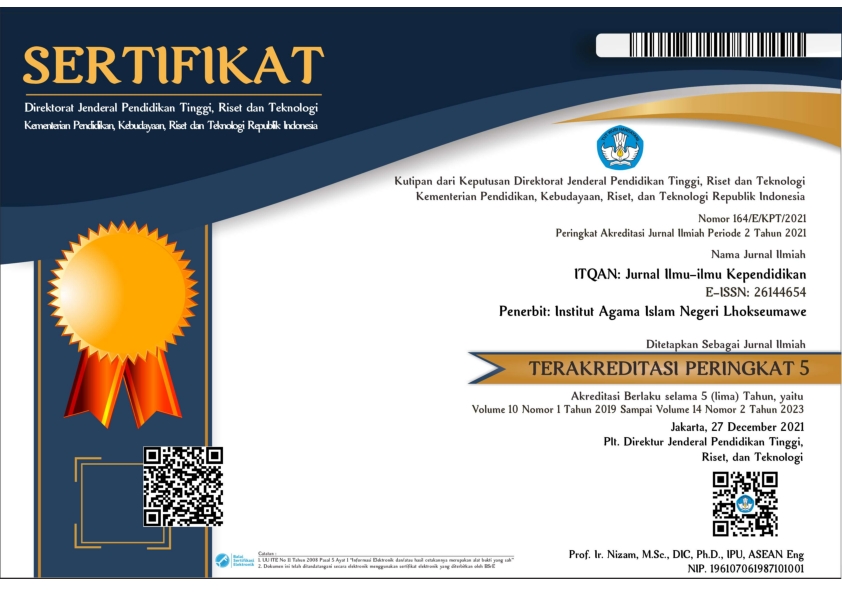Penggunaan Metode Variatif dengan Pendekatan Saintifik dalam Pembelajaran Fikih di Madrasah Ibtidaiyah Kota Lhokseumawe
Main Article Content
Aisyah Maawiyah
Fauziana Fauziana
This research was conducted at Madrasah Ibtidaiyah Kota Lhokseumawe to explore the use of varied methods with a scientific approach in teaching Fiqh, as well as the constraints and efforts made by teachers in implementing them. This study used a qualitative approach with data collection techniques through interviews and observations. The research respondents consisted of Fiqh teachers and the Head of Madrasah Ibtidaiyah Kota Lhokseumawe. The results of the study found that teachers at Madrasah Ibtidaiyah Kota Lhokseumawe used varied methods in teaching Fiqh, such as lectures, question and answer sessions, discussions, and demonstrations. They also applied a scientific approach with steps including observation, questioning, exploration, association, and communication. However, there were constraints such as a lack of reading materials and teaching media, a lack of understanding of the scientific approach, and a lack of support in facilities and infrastructure. To improve the effectiveness of teaching, it is recommended that teachers be more creative in creating teaching media, searching for teaching materials, and opening up discussion spaces with students. School principals also need to provide support and participate in training to enhance teachers' understanding of curriculum implementation.
Arikunto, S. (2019). Prosedur Penelitian Suatu Pendekatan Praktik. Rineka cipta.
Barrows, H. S. (1994). Practice-Based Learning: Problem-Based Learning Applied to Medical Education. ERIC.
Bashori, B., Novebri, N., & Salabi, A. S. (2022). Budaya Pesantren: Pengembangan Pembelajaran Turats. Al Mabhats: Jurnal Penelitian Sosial Agama, 7(1), 67–83. https://journal.iainlhokseumawe.ac.id/index.php/AlMabhats/article/view/911.
Billah, M. (2022). Pengembangan Variasi Mengajar Guru di Madrasah Tsanawiyah Attaraqqie Malang. Evaluasi: Jurnal Manajemen Pendidikan Islam, 6(2), 330–344. https://e-journal.staima-alhikam.ac.id/evaluasi/article/view/1138.
Daeng Lufti Azizan, Rico Mahendra, Shintia Dinda Pitaloka, Muthia Syahrena Zein, Halimah Syafira Irwanmay, & Dini Nur Hidayah. (2021). Upaya Guru PAI dalam Mengembangkan Kreativitas Siswa pada Mata Pelajaran PAI. Education & Learning, 1(2), 36–38. https://doi.org/10.57251/el.v1i2.48.
Fajrussalam, M. (2019). Penggunaan Metode Pembelajaran Variatif dalam Meningkatkan Motivasi Belajar IPS Siswa Kelas IX E di SMP Islam Al-Maarif 01 Singosari. Universitas Islam Negeri Maulana Malik Ibrahim. http://etheses.uin-malang.ac.id/16227/.
Fatha Pringgar, R., & Sujatmiko, B. (2020). Penelitian Kepustakaan (Library Research) Modul Pembelajaran Berbasis Augmented Reality pada Pembelajaran Siswa. Jurnal IT-EDU, 05(01), 317–329. https://ejournal.unesa.ac.id/index.php/it-edu/article/view/37489.
Fawaidi, B. (2021). Model dan Organisasi Pengembangan Kurikulum. ITQAN: Jurnal Ilmu-Ilmu Kependidikan, 12(1), 33–46. https://doi.org/10.47766/itqan.v12i1.186.
Kismatun, K. (2021). Cntextual Teaching and Learning dalam Pendidikan Agama Islam. TEACHER : Jurnal Inovasi Karya Ilmiah Guru, 1(2), 123–133. https://doi.org/10.51878/teacher.v1i2.718.
Kurniaman, O., & Noviana, E. (2017). Penerapan Kurikulum 2013 dalam Meningkatkan Keterampilan, Sikap, dan Pengetahuan. Primary: Jurnal Pendidikan Guru Sekolah Dasar, 6(2), 389-396. https://primary.ejournal.unri.ac.id/index.php/JPFKIP/article/view/4520.
Liu, S., & Hallinger, P. (2018). Principal Instructional Leadership, Teacher Self-Efficacy, and Teacher Professional Learning in China: Testing a Mediated-Effects Model. Educational Administration Quarterly, 54(4), 501–528. https://doi.org/10.1177/0013161X18769048.
Mardhiyah;, R. H., Aldriani;, S. N. F., Febyana Chitta;, & Muhamad Rizal Zulfikar; (2021). Pentingnya Keterampilan Belajar di Abad 21 sebagai Tuntutan dalam Pengembangan Sumber Daya Manusia. Lectura: Jurnal Pendidikan, 12(1), 29–40. https://doi.org/10.31849/lectura.v12i1.5813.
Miles, M.B, Huberman, A.M, dan S. J. (2014). Qualitative Data Analysis: A Methods Sourcebook (3rd ed.). Sage Publications.
Mustofa, R. F., & Hidayah, Y. R. (2020). The Effect of Problem-Based Learning on Lateral Thinking Skills. International Journal of Instruction, 13(1), 463–474. https://eric.ed.gov/?id=EJ1239210.
Nurfadhillah, S. (2021). Media Pembelajaran: Pengertian Media Pembelajaran, Landasan, Fungsi, Manfaat, Jenis-Jenis Media Pembelajaran, dan Cara Penggunaan Kedudukan Media Pembelajaran. CV Jejak (Jejak Publisher).
Nusroh, S., & Luthfi, E. (2020). Analisis Kesulitan Belajar Pendidikan Agama Islam (PAI) serta Cara Mengatasinya. Belajea; Jurnal Pendidikan Islam, 5(1), 71. https://doi.org/10.29240/belajea.v5i1.1145.
Prasetyo, M. A. M., & Salabi, A. S. (2022). Multikriteria Analisis untuk Pengembangan Berkelanjutan Organisasi Pembelajaran. Southeast Asian Journal of Islamic Education Management, 3(1), 157–176. https://doi.org/10.21154/sajiem.v3i1.96.
Subhan, A. (2013). Penerapan Strategi Belajar Aktif (Active Learning Strategy) dalam Pembelajaran Pendidikan Agama Islam di SD Islam Nurul Hidayah. https://repository.uinjkt.ac.id/dspace/handle/123456789/32687.
Sugiyono. (2020). Metode Penelitian Kualitatif. Alfabeta.
Taufiqurrahman, T., & Junaidi, J. (2021). Pembelajaran Berbasis Proyek (Project-Based Learning) untuk Mengembangkan Keterampilan Abad 21. INCARE, International Journal of Educational Resources, 02(02). https://ejournal.ijshs.org/index.php/incare/article/view/255.
Waluyo, B. (2021). Pengembangan Media Pembelajaran PAI Berbasis ICT. JURNAL AN-NUR: Kajian Ilmu-Ilmu Pendidikan dan Keislaman, 7(02), 229–250. https://www.journal.an-nur.ac.id/index.php/annur/article/view/132.




